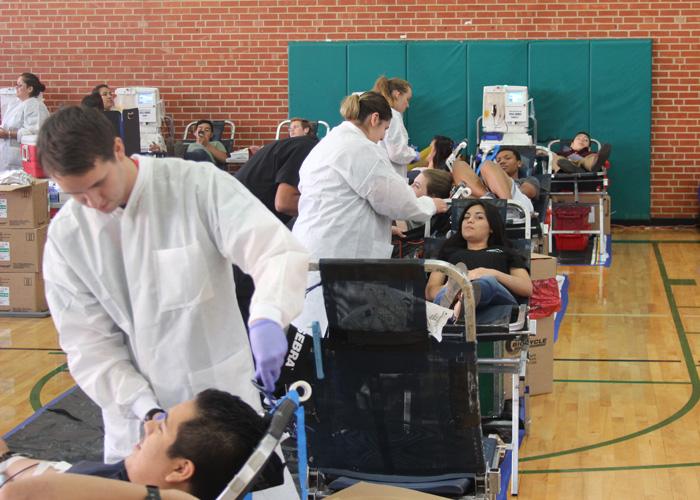Colts donate blood to save lives
Students donate blood during the blood drive in October. StuCo and Carter BloodCare host two drives each year and collect enough blood to save hundreds of lives.
The last blood drive of the year was held earlier this week and hundreds of lives will be saved from the donations collected.
According to the Carter BloodCare website, “Red blood cells are used for accident victims, surgical patients, and people with anemia, platelets are used for leukemia and cancer patients, undergoing surgery and low platelet conditions, and plasma is used for patients with burns, blood disorders and other conditions.”
There are a number of requirements that must be followed to be able to donate blood including: donors must be 16 years or older, weigh a minimum of 110 pounds, and cannot be taking certain types of medications.
“My age is something that has stopped me from donating blood,” Lee Cervantes, sophomore, said.
High school blood drives are responsible for 25% of donated blood. Donating blood is important because for every donation three people are saved, and every two seconds someone in the U.S is in need of blood.
“What made me decide to donate is the fact that I always saw commercials on television and this is the only thing I can donate in my age,” Brenda Ramos, junior, said.
Many tests are performed on donated blood, for example, cholesterol, HIV, hepatitis, syphilis, chaga disease, west nile virus and more.
“I would donate again because it would help people in need of it and I have plenty more,” Ramos said.
Although this was the last on-campus blood drive of the year, people can still donate at Carter donor centers.
QUALIFICATIONS
- ID: All donors must present a valid photo ID at the time of donation.
- Age: At least 16 years of age and in good general health. Sixteen-year-olds must have written parental consent. There is no upper age limit.
- Weight: Minimum of 110 pounds.
- Medications: Cannot give if currently taking antibiotics. Cannot give if taking Accutane, Propecia or Proscar. Platelet donors cannot give if taking aspirin or Plavix. Okay to give if taking vitamins, birth control, or medicine for: allergies, blood pressure, thyroid replacement, female hormones, anxiety or high cholesterol, as well as most other medications.
- Eating: Eat a low-fat meal within two to four hours before giving.
- Drinking: Drink lots of water or juice before and after donating. Avoid alcoholic beverages for 12 hours before and after donating.
- Shots: Okay after allergy shots, influenza vaccine, hepatitis A vaccine, tetanus shot.
- Strenuous activity: Avoid for 12 hours after donating. Individuals with a hazardous or strenuous job should donate at the end of their work shift.
- Cancer: Okay to donate after curative treatment for basal cell skin cancer and squamous cell skin cancer. For melanoma and most solid tumors, including those due to breast cancer, it is okay to give two years after completion of all treatment. Exceptions are noted under “Permanent disqualifications.”
- Diabetes: Okay if controlled by human or porcine insulin, oral medication or diet.
TEMPORARY DISQUALIFICATIONS
- Cold/Flu/Don’t feel well: One day symptom-free. Deferred until feeling well and healthy.
- Pregnancy: Okay to donate six weeks after end of pregnancy.
- Earlobe piercing: Okay to donate if performed with a single-use device. If not, wait one year.
- Body and ear cartilage piercing: Okay to donate, if performed in a Texas state–licensed facility. If not, wait one year.
- Hepatitis B vaccine: Okay to give two weeks after vaccine.
- Tattoo: Okay to donate if performed at a Texas state-licensed facility, otherwise wait one year from date of procedure.
- Last blood donation: Eight weeks between whole blood donations. Seven days between platelet donations up to 24 times per year. Sixteen weeks between automated double red cell donations.
- Blood transfusion or tissue transplant: None in the past year.
- Malaria: One year following travel to malarial area as defined by the Centers for Disease Control and Prevention (CDC). If you contract malaria, okay to donate three years after malaria is cured.

